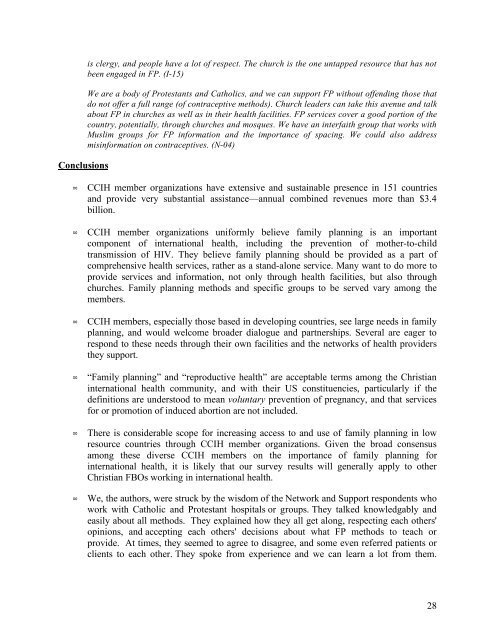International Family Planning: Christian Actions and Attitudes
International Family Planning: Christian Actions and Attitudes
International Family Planning: Christian Actions and Attitudes
Create successful ePaper yourself
Turn your PDF publications into a flip-book with our unique Google optimized e-Paper software.
Conclusions<br />
is clergy, <strong>and</strong> people have a lot of respect. The church is the one untapped resource that has not<br />
been engaged in FP. (I-15)<br />
We are a body of Protestants <strong>and</strong> Catholics, <strong>and</strong> we can support FP without offending those that<br />
do not offer a full range (of contraceptive methods). Church leaders can take this avenue <strong>and</strong> talk<br />
about FP in churches as well as in their health facilities. FP services cover a good portion of the<br />
country, potentially, through churches <strong>and</strong> mosques. We have an interfaith group that works with<br />
Muslim groups for FP information <strong>and</strong> the importance of spacing. We could also address<br />
misinformation on contraceptives. (N-04)<br />
• CCIH member organizations have extensive <strong>and</strong> sustainable presence in 151 countries<br />
<strong>and</strong> provide very substantial assistance—annual combined revenues more than $3.4<br />
billion.<br />
• CCIH member organizations uniformly believe family planning is an important<br />
component of international health, including the prevention of mother-to-child<br />
transmission of HIV. They believe family planning should be provided as a part of<br />
comprehensive health services, rather as a st<strong>and</strong>-alone service. Many want to do more to<br />
provide services <strong>and</strong> information, not only through health facilities, but also through<br />
churches. <strong>Family</strong> planning methods <strong>and</strong> specific groups to be served vary among the<br />
members.<br />
• CCIH members, especially those based in developing countries, see large needs in family<br />
planning, <strong>and</strong> would welcome broader dialogue <strong>and</strong> partnerships. Several are eager to<br />
respond to these needs through their own facilities <strong>and</strong> the networks of health providers<br />
they support.<br />
• “<strong>Family</strong> planning” <strong>and</strong> “reproductive health” are acceptable terms among the <strong>Christian</strong><br />
international health community, <strong>and</strong> with their US constituencies, particularly if the<br />
definitions are understood to mean voluntary prevention of pregnancy, <strong>and</strong> that services<br />
for or promotion of induced abortion are not included.<br />
• There is considerable scope for increasing access to <strong>and</strong> use of family planning in low<br />
resource countries through CCIH member organizations. Given the broad consensus<br />
among these diverse CCIH members on the importance of family planning for<br />
international health, it is likely that our survey results will generally apply to other<br />
<strong>Christian</strong> FBOs working in international health.<br />
• We, the authors, were struck by the wisdom of the Network <strong>and</strong> Support respondents who<br />
work with Catholic <strong>and</strong> Protestant hospitals or groups. They talked knowledgably <strong>and</strong><br />
easily about all methods. They explained how they all get along, respecting each others'<br />
opinions, <strong>and</strong> accepting each others' decisions about what FP methods to teach or<br />
provide. At times, they seemed to agree to disagree, <strong>and</strong> some even referred patients or<br />
clients to each other. They spoke from experience <strong>and</strong> we can learn a lot from them.<br />
28

















